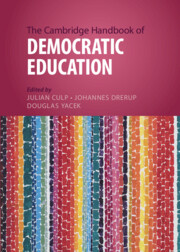Book contents
- The Cambridge Handbook of Democratic Education
- Cambridge Handbooks in Education
- The Cambridge Handbook of Democratic Education
- Copyright page
- Contents
- Contributors
- Acknowledgments
- Introduction
- Part One Historical Perspectives
- Part Two Philosophical and Normative Foundations
- Part Three Key Topics and Concepts
- 16 Educational Justice and Democratic Education
- 17 Global Justice and Democratic Education
- 18 Debate and Deliberation in Democratic Education
- 19 Agonistic Democracy and the Question of Education
- 20 Punishment and Democratic Education
- 21 Children’s Rights and Democratic Education
- 22 Education, Trust, and the Conversation of Democracy
- 23 Patriotism and Democratic Education
- 24 The Voice of Poetry in Cultivating Cosmopolitan and Democratic Imagination
- 25 Disability and Democratic Education
- Part Four Challenges
- Index
- References
24 - The Voice of Poetry in Cultivating Cosmopolitan and Democratic Imagination
from Part Three - Key Topics and Concepts
Published online by Cambridge University Press: 20 April 2023
- The Cambridge Handbook of Democratic Education
- Cambridge Handbooks in Education
- The Cambridge Handbook of Democratic Education
- Copyright page
- Contents
- Contributors
- Acknowledgments
- Introduction
- Part One Historical Perspectives
- Part Two Philosophical and Normative Foundations
- Part Three Key Topics and Concepts
- 16 Educational Justice and Democratic Education
- 17 Global Justice and Democratic Education
- 18 Debate and Deliberation in Democratic Education
- 19 Agonistic Democracy and the Question of Education
- 20 Punishment and Democratic Education
- 21 Children’s Rights and Democratic Education
- 22 Education, Trust, and the Conversation of Democracy
- 23 Patriotism and Democratic Education
- 24 The Voice of Poetry in Cultivating Cosmopolitan and Democratic Imagination
- 25 Disability and Democratic Education
- Part Four Challenges
- Index
- References
Summary
This chapter illuminates the irreplaceable value of poetry in cultivating a cosmopolitan and democratic imagination. The authors contend that poetry evokes unanticipated or overlooked ideas, emotions, and possibilities; it provokes people to look beyond their settled views. Poetry uniquely fuels their ability to engage new thoughts, values, and practices. This ever-renewing quality of mind can, in turn, help people reimagine the nature and value of education continuously as circumstances and the needs they call out evolve. The authors suggest that these imaginative capacities are significant given the cosmopolitan and democratic challenges, and prospects, generated by an intensifying process of political, economic, and cultural globalization. The chapter features a reading of Walt Whitman’s well-known epic poem, “Song of Myself” (first published in 1855), which the authors show both articulates and enacts the most profound promise in a cosmopolitan and democratic imagination.
Keywords
- Type
- Chapter
- Information
- The Cambridge Handbook of Democratic Education , pp. 395 - 415Publisher: Cambridge University PressPrint publication year: 2023



